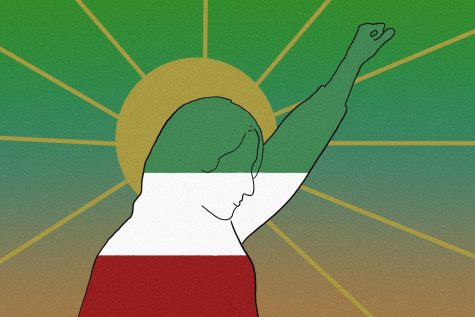Revolutionary movement ignites in Iran sparking global protests and discussions close to home
November 9, 2022

After the death of Mahsa Amini, a 22-year-old Iranian woman, who died after being detained by Iran’s morality police for the way she wore her hijab, a global, revolutionary movement has emerged and Columbia students are adding their voices.
In response to Amini’s death, women have primarily led protests and riots against the Iranian regime, many burning their hijabs and cutting their hair.
At Columbia, Kashf Fatima, a senior marketing major and vice president of the Muslim Student Association said the student organization has discussed what is happening in Iran from a Muslim perspective.
“We were talking about where should we stand, as women, we may stand with one way, but as a Muslim woman, where do we stand?” Fatima said.
Fatima said she supports the Iranian women affected by the morality police but does not necessarily agree with burning the hijab.
“When you say [take off your hijab], you kind of ignore the whole meaning behind it,” Fatima said.
Fatima said at this point, burning the hijab is a political statement, and that even in the Muslim community, people are trying to paint certain narratives to fit an agenda.
“A lot of people are saying, ‘They’re burning the hijab? What are they going to do next, burn the Quran?’ basically painting women who burn their hijabs as bad Muslims who are trying to ruin the name of Islam,” Fatima said.
“Some people are saying, ‘Oh, they’re just burning a piece of fabric,’ but then you realize the politics tied to that piece of fabric … you realize how powerful that protest is, Fatima said. “[The government is] forced to watch something that they mandated so hard.”
Sumana Syed, junior film and television major and Student Organization Committee representative for MSA, is saddened that a lot of Muslim countries do not give women a choice about wearing a hijab.
“As a Western woman, I was given the choice in America to practice my religion however I want to. Even in my family, I wasn’t forced to wear a hijab,” Syed said. “It really saddens me that these women are being forced to do something they don’t want to do. … As a Western Muslim, I just hope that this protest brings about some kind of change for women in Iran, and other Muslim countries as well.”
For Syed, wearing a hijab is a form of religious expression, and about “pleasing God.”
“In our religion, hijab is meant to be a way for women to preserve their beauty and show that women are more than just a physical body or something nice to look at, rather, women have ideas, they have intelligence, they are a person,” Syed said.
Zahra Nbvi, a sophomore at University of Illinois Chicago, has family in Iran and said she receives on-the-ground updates from them.
“It’s been a bit overwhelming and tough,” said Nbvi.
Nbvi said she is frustrated with the Western media coverage of the protests.
“The media really focuses on a certain aspect of society right now, and I don’t think that’s fair to the rest of Iranians who don’t want regime change, they want reform.”
Ariana, a recent Loyola University Chicago graduate now in Washington, D.C. who requested the Chronicle not disclose their last name, said this is the first true feminist women-led revolution of this generation’s time.
“It’s not just about getting rid of mandatory hijab, it’s about a heinous regime that murders, kidnaps, tortures its own people, and deprives them of the things that they need,” Ariana said.
Ariana said people are inspired, but they are not as alarmed as they need to be.
“This is so historical, we have to pay attention,” Ariana said. “Yes, it’s so inspiring, but kids are being shot in the head right now, 17-year-old girls are being raped before they are killed because it’s illegal to murder a virgin in the Islamic Republic.”
Ariana said social media has played a huge role in this story.
“When you think about how the Black Lives Matter protests blew up, specifically because of the shared video of George Floyd’s death, … it really woke people up and I think it led to the massive, widespread BLM protest we saw in 2020,” Ariana said. “I think because of the publicization of what happened to Mahsa, and everyone else who has been tortured, killed, raped, kidnapped since… that has been generating more anger, frustration, passion towards this issue.”







